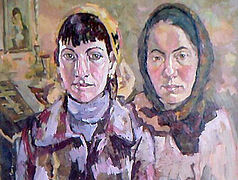 Photo: Andrei Khitailenko/Pravoslavie.ru
Photo: Andrei Khitailenko/Pravoslavie.ru
In our travels to the Russian monasteries, my friend and I always make sure to be of help for the monastery we are visiting: anytime we stay there for more than two days, we seek permission to work there as laborers. We are not so much of a high-skilled labor, but we gladly and easily perform simple tasks: we worked as yard-keepers, chopped firewood, hauled away the construction refuse from the construction site, and even plastered walls to the extent possible. More often than not, the monastery gladly accepts our offers of help and later commends us for our work. This way, once we get back on the road, it feels like we made a difference there, unlike the camera-clicking, gawking tourists.
As we were working in one of the monasteries, we noticed how a brother who worked with us reacted to the exalted exclamations, “Ahh, what a bliss! I wish I could stay here!” coming from new throngs of pilgrims or tourists arriving for a brief visit there. We’d watch how a group of them, with phone cameras dutifully hissing and swishing, walk past our “partly monastic gang” and utter soft gasps, “Sheer blessedness! I’m dying to stay here!,” while we either kept working determinedly or smiled politely in return. As for our foreman the monk, we saw that he typically responded quite dryly to these sentiments. Sure, he was never rude or took issue with these visitors – but it was quite obvious that the things they said did bother or annoy him. Once the tourists were out of sight, he’d be himself again, as jovial and mellow as before.
After we finished our work and sat down for a meal, we asked him why he reacted this way. We had a right to, ‘cause we were work buddies, after all, even if for a short while! The monk explained:
“I think we take these words too lightly and fail to notice their genuine meaning. You see, the word “blessedness” is a very important word, and we shouldn’t waste it to describe the feelings that are often simply about the feel-good or, even worse, physiology-driven emotions. Say, we are riding on a train: we sit in our nice and tidy stateroom, enjoying a cup of coffee and taking in the beautiful views outside, – the hills, if not the mountains, like we have here. We see the houses, and they look pretty, too, with orchards full of ripened fruit and their owners taking a rest, sitting on benches outside. Why don’t we leave the train and stay with them? Right away, in this instant, so that everything would freeze in time just as we saw it! Why can’t we simply spend the rest of our life in this exalted state of mind!”
“Sure, it happens,” we agree with him. “But isn’t it blessedness when you stay inside your cozy home on a gorgeous winter day, your bathhouse is getting hotter nearby and, far away in the distance, you can see the church brightly lit by the winter sun – so neat!”
“Exactly! But let’s be honest: all of that is pure emotion. Let’s say, we get off that train. But we will surely find out that this enchanting paradise requires a great deal of hard work: it turns out that a bathhouse can’t get hot on its own, the orchard needs pruning, and your house should be mopped every day. On top of that, not every man sitting on the bench will end up being angel like. But we still do all of those oohs and aahs: “It’s pure blessedness!” It is a no-nonsense word that denotes an enormous common effort of our body, soul, and the spirit. Besides, there is no guarantee you will be endowed with blessedness in the end: it all depends on God. I would rather suggest that we distinguish between our spiritual delight, esthetic pleasure, and the Divine grace. The first two states of our minds should rather not be confused with a lofty spiritual practice of Christian ascetics. What’s the conclusion? Be careful what you say!”
“OK, but what about the monastery? That’s exactly where you can find blessedness!”
“Even more so—watch what you are saying there! And in general… We had a visitor a couple of weeks ago: “Oh, it’s pure bliss here, can I spend a month or so with you? I’ll take any obedience, will do anything! At last, I can taste the life of a monastic.” So, we offered to him to chop wood. He was happy. Can you guess when he left? The next morning! Because he had to attend services as well. Apart from that, as soon as he was left all alone and had to work in solitude, that “blessed state” he was talking about was suddenly gone. It was all gone, all that delight, the fervor has worked itself out and even that sparkle in his eyes was lost. ‘Hmm, the monastery,’ he said, ‘is a rather serious thing – I had no idea…’ Oh well, he learned something new. And we learned with him, too. Because we also sometimes tend to forget how much “the monastery is a rather serious thing,” not mentioning the spiritual life in general.”
“Alright, if it depends on God, whether the man is worthy of blessedness or not, is there anything we should do?”
The monk smiled:
“Our job is to keep doing our deadly dull job! It means that we should remember about constancy of faith and live it: it is “dull” to work, “dull” to repent, and “dull” to pray—the tedium of life, so to speak. Yet, someone lived in the desert and wandered in sheepskins and goatskins in this “dullness”…”
“Why are you smiling, then?”
“Because it has nothing to do with boredom: to live with God, wherever it may be. So, when will you two be leaving?”
We did finish chopping firewood. Without many words. And, trust me, there was no dullness anywhere in sight…




